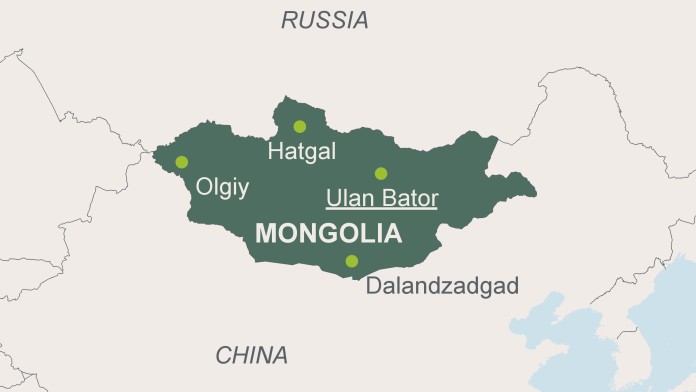

Germany and Mongolia share a long-standing relationship spanning a range of areas. It is said that 30,000 Mongolians speak German, about 1% of the total population. The former East Germany was a valued partner country of Mongolia until the collapse of the Soviet Union. The reunified country of Germany then assumed this role in the early 1990s. Since 1992, KfW has been active in Mongolia as part of financial cooperation on behalf of the German Federal Ministry for Economic Cooperation and Development (BMZ).
There is close cooperation in the following areas:
Mining is very important for the country, due to its abundance of raw materials (especially coal, copper and gold). The industrial sector represents about 42% of GDP, the bulk of which is accounted for by the mining industry. Well-trained specialists are needed in order to make sustainable use of this wealth of resources on a large scale. KfW, on behalf of the BMZ, is thus supporting the expansion of the German-Mongolian Institute for Resources and Technology (GMIT), which was founded in 2013. GMIT makes an important contribution to providing trained and qualified specialists for sectors including the extractive industries, thereby impacting positively on employment and sustainable economic development.
Mongolia's climate is characterised by very long and cold winters. The majority of the electricity and heat supply is generated by Soviet-design thermal (heat and) power plants. These power plants have a low level of operating efficiency and, like large parts of the transmission and distribution network, are antiquated and susceptible to malfunctions. This is already putting the security of supply at risk today and in some cases it leads to extreme air pollution and high levels of greenhouse gas emissions. This is where the projects in the area of energy efficiency financed by KfW on behalf of the BMZ start: FC’s commitment contributes to energy security, the country's socio-economic development and to climate change mitigation.
Mongolia is a unique refuge for flora and fauna in the region. In recent years, however, the pressure on ecosystems has increased considerably. Most of the land is used intensively, but not sustainably, largely due to livestock farming and the large coal and copper mines in the south of the country. This is compounded by the impacts of climate change. As a result, according to the United Nations, up to 70% of the country's land area is at risk of desertification. In recent years, the governments’ environmental policy reforms have significantly improved the conditions for protecting biodiversity. Almost 30% of the country’s territory has been granted protected status. Mongolia has thus demonstrated its commitment to nature conservation and its willingness to implement the UN Convention on Biological Diversity. On behalf of the BMZ, KfW is therefore helping Mongolia to manage conservation areas and thus to implement the above-mentioned UN Convention.
KfW Office Ulan Bator
Seoul Street 21, 5th floor
Naiman Zovkhis Building
14251 Ulan Bator
Mongolia
